
As 2018 draws to a close, 24/7 Wall St. is taking a look at the most important news events of the year.
The main themes of 2018 involve cultural shifts, environmental impacts, missteps among technology companies, changes in American diplomacy, the passing of two notable American leaders who symbolized bipartisanship, the ongoing investigation of President Donald Trump, and the surging economy.
Click here to read about the most important news events of the year.
Click here to see our methodology.
Prominent among these themes was the increased influence and power of women and minorities.
The #MetToo movement, which began in 2017 with the revelation that movie mogul Harvey Weinstein had sexually assaulted women over the years, did not abate in 2018 as more women shared their stories, and more men were held accountable for their actions. Weinstein was indicted on three additional charges of sexual assault in 2018, and comedian Bill Cosby, the formerly beloved “America’s Dad,” was jailed for sexual assault.
The motion picture “Black Panther,” an action movie whose main characters are mostly black, became a cultural phenomenon in 2018 and grossed over $1 billion, more than any other film this year.
We were reminded of the fragility of the environment by the savagery of hurricanes and wildfires. Several more scientific reports, as well as reports from the United Nations and the White House, emphasized the need for more urgent action. Hurricanes Florence and Michael slammed the Carolinas and Florida, respectively, and wildfires in California in November consumed a record amount of acreage there.
There were also several episodes of data breaches and mishandling of data, including the disclosure that political consulting firm Cambridge Analytica had accessed the data of millions of Facebook users without their knowledge.
On the diplomatic front, Trump met with North Korean leader Kim Jong Un, the first time the leaders of those two nations had ever met. Trump also pulled the United States out of the nuclear deal with Iran in May, an agreement he had criticized on the campaign trail.
The year also saw the passing of former president George H.W. Bush and Sen. John McCain, two symbols of a less-polarized political era.
The ongoing investigation of the president by special counsel Robert Mueller picked up momentum in early December, when federal prosecutors presented more details of hush money payments made to two women, who allegedly had affairs with Trump. The president’s former attorney Michael Cohen, who was involved in the hush-money deal, was sentenced for various crimes including tax evasion and campaign finance violations.
Here are the most important stories of 2018.

US economy surges
The U.S. economy is ending 2018 with the wind at its back. The jobless rate fell to 3.7% in November, near a 50-year low. GDP expanded at a 3.5% annual rate in the third quarter, according to the Commerce Department, following a 4.2% growth in the second quarter. The economic expansion has been buoyed by tax cuts and federal spending increases. It also has been underpinned by massive corporate borrowing that could pose a problem for companies as interest rates rise. In the first quarter of 2018, American companies held a total of $29.6 trillion in debt, more than ever. Some economists do not think economic growth is going to last at this rate next year. Economists surveyed by The Wall Street Journal estimate growth will slow to 2.5% by the first quarter of next year and to 2.3% by the third quarter of 2019. The decline in the stock market suggests economic headwinds next year.
[in-text-ad]
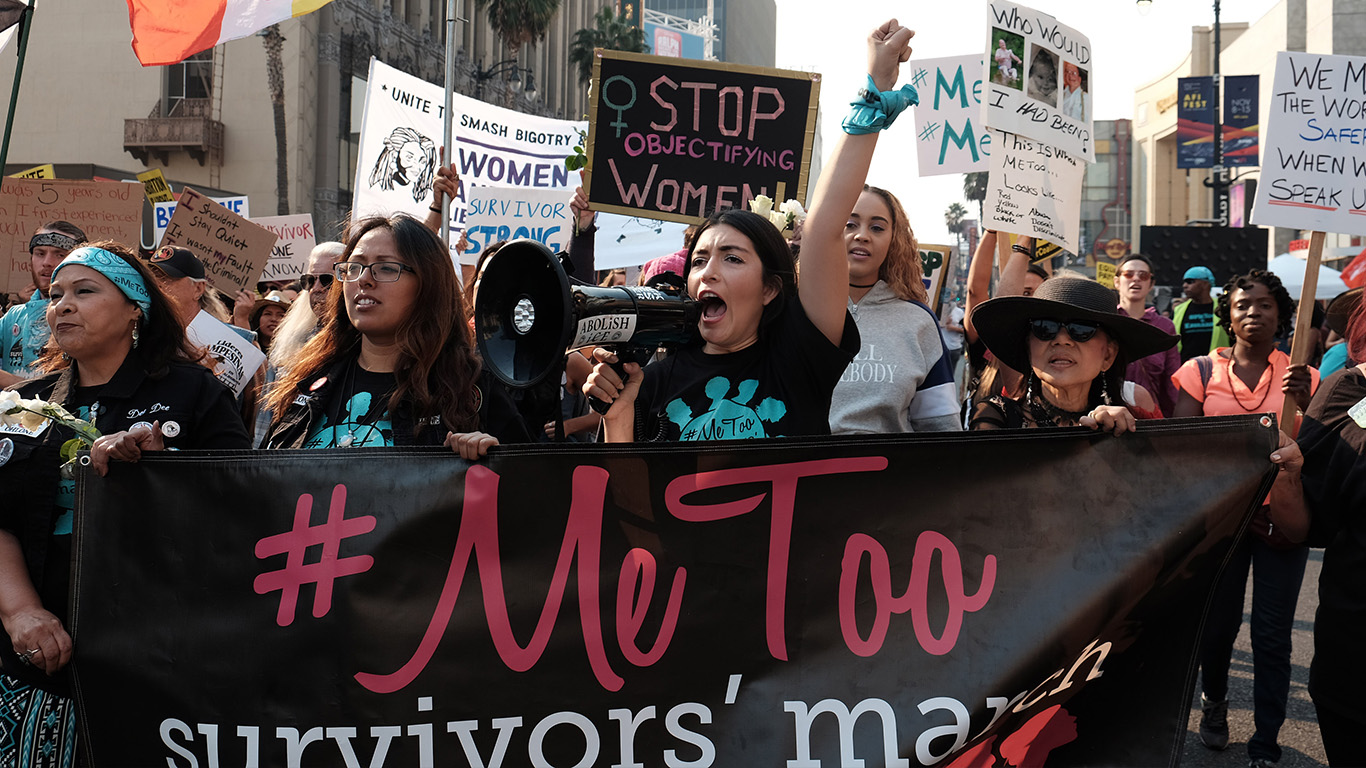
#MeToo movement
The #MeToo Movement, which broke into the open last year with the revelations of sexual abuse by Hollywood mogul Harvey Weinstein and went on to take down powerful men in business, entertainment, and media, showed no signs of abating in 2018. Weinstein was indicted on sexual abuse charges in June, and Bill Cosby, once known as “America’s Dad,” was convicted in April on three counts of aggravated indecent sexual assault. Other prominent men were taken down as well, including Wynn Resorts CEO Steve Wynn, architect Richard Meier, and CBS CEO Les Moonves. The movement also had unwanted consequences, leading some men to avoid working with women, according to a story in Bloomberg News.
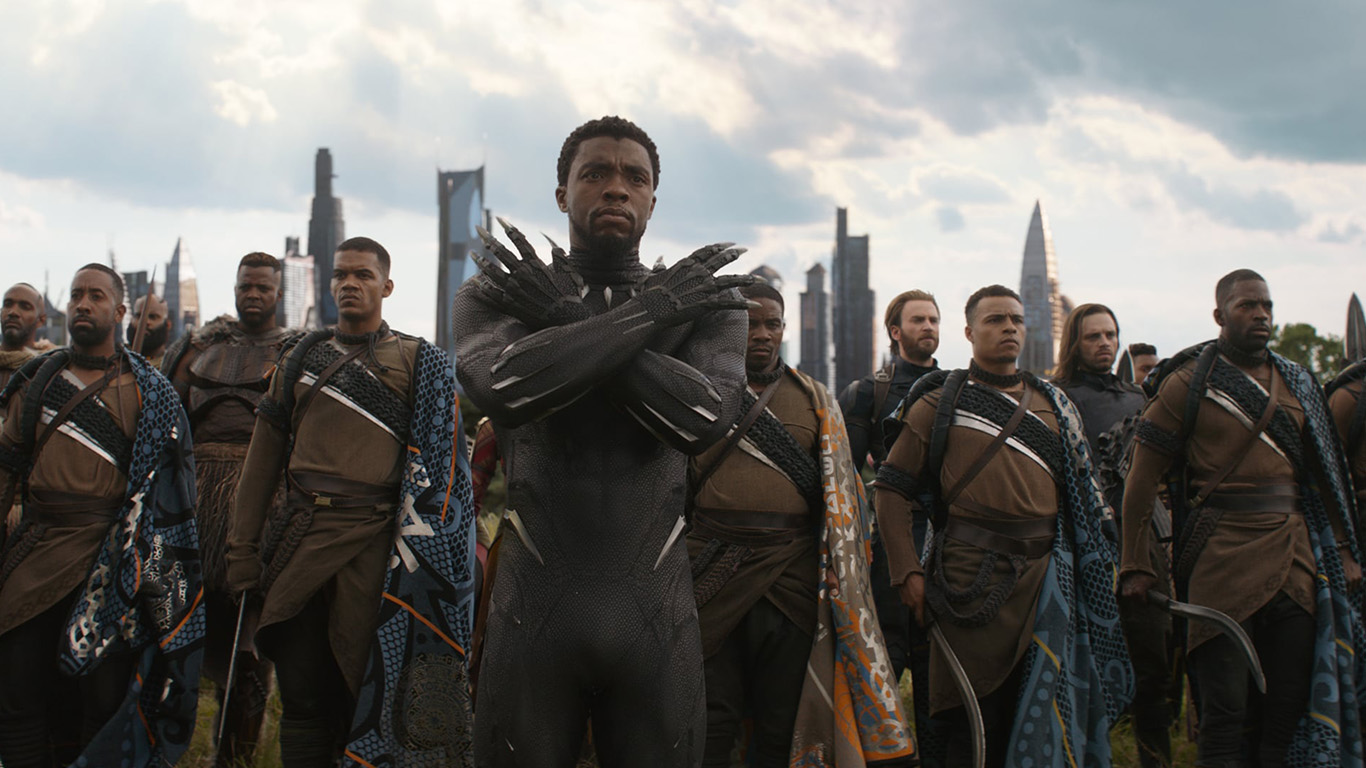
‘Black Panther’
The motion picture “Black Panther” became a cultural phenomenon in 2018. The main characters were originally conceived in 1966 by Stan Lee and Jack Kirby for African Americans to identify with. In the movie, the characters rule the mythical African kingdom of Wakanda. They are scientists and inventors, are technologically advanced, and are the guardians of vibranium, a powerful element derived from a fallen meteor. Even before it was released, interest in the movie exploded on social media, and Twitter reported “Black Panther” was the most tweeted-about film of 2017, even though it had not yet been released. “Black Panther” not only is a certifiable blockbuster, topping ticket sales of $1.3 billion, but also is poised to become the first comic book film to be nominated for the best picture Oscar.
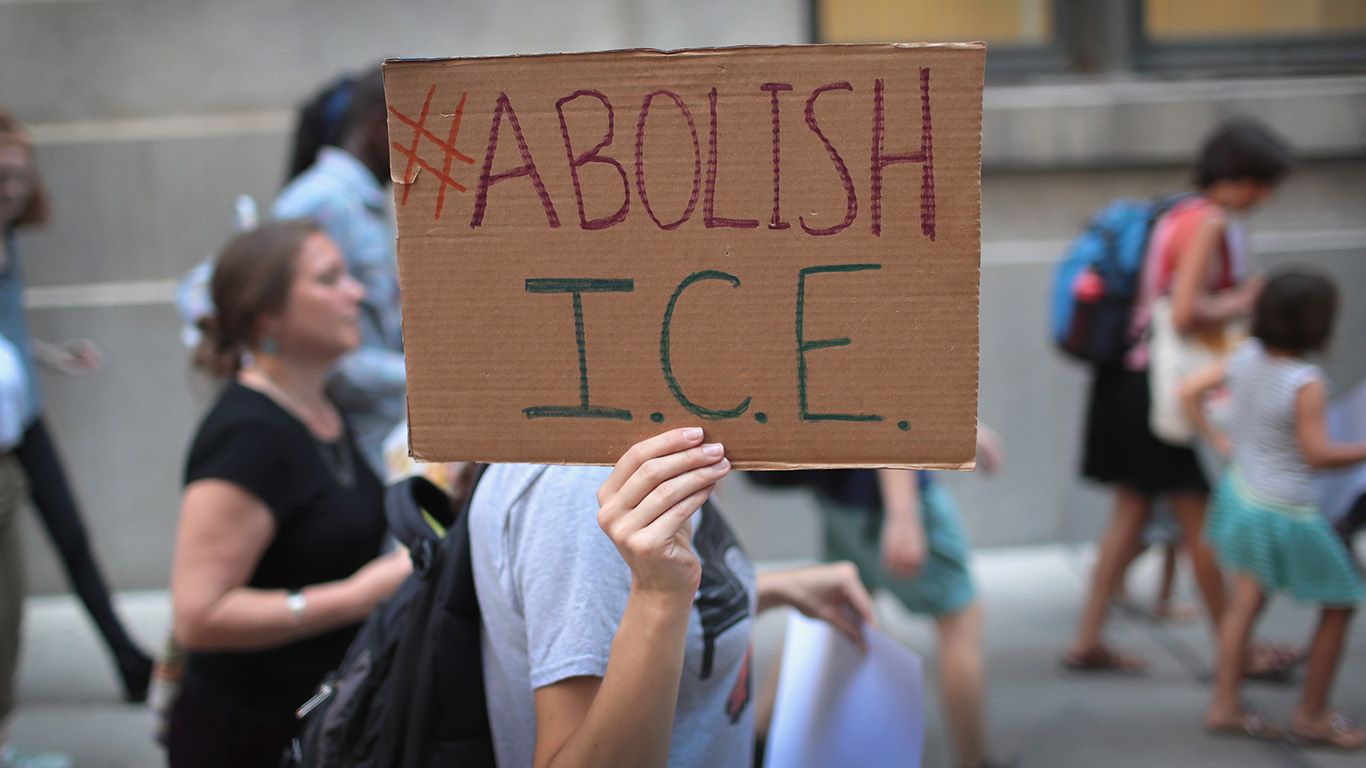
Immigration battle
The United States, a land of immigrants, grappled with the immigration question in 2018, and it was one of the most divisive issues this year. In June, after months of U.S. authorities forcing the separation of children of undocumented immigrants from their parents, the Trump administration, under pressure from across the political spectrum, signed an executive order halting the policy. The focus of America’s immigration policy shifted to the Immigration and Customs Enforcement (ICE), a division within the Department of Homeland Security. Critics of ICE demanded that it be abolished for what they claimed was its heavy-handed approach to border enforcement. Another bone of contention was how to deal with a caravan of refugees from Central America progressing through Mexico and headed for the U.S. border and how to process refugees who seek asylum.
[in-text-ad-2]
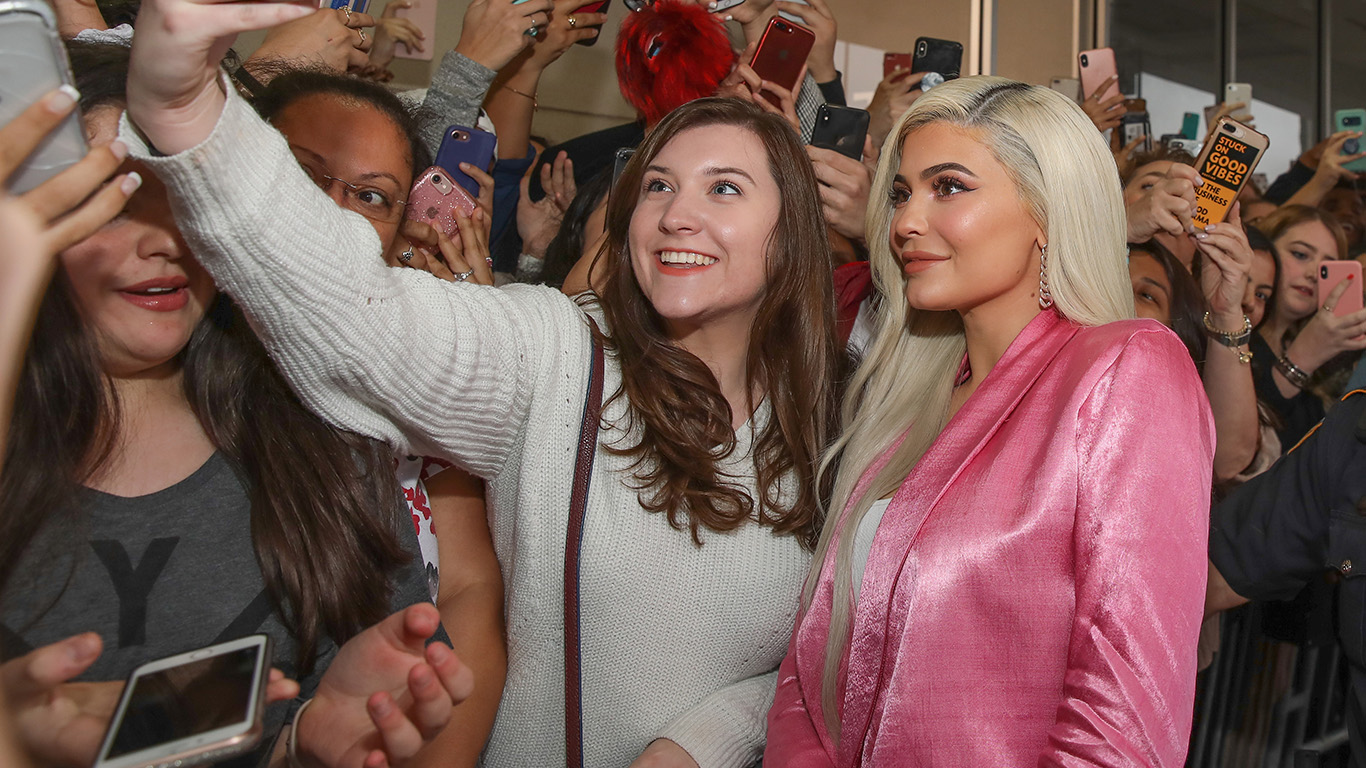
Kylie Jenner, billionaire
At 21 years old, Kylie Jenner is poised to become the youngest self-made billionaire. In July, Forbes magazine put Jenner’s net worth at $900 million, amassed since she launched her Kylie Cosmetics line in 2015. Forbes, which put Jenner on the cover of its August issue on America’s Women Billionaires, also said the $900 million figure was probably a conservative estimate. Jenner’s accomplishment is a testament to the ability of celebrities to leverage various communication channels — television, social media, motion pictures — to build a brand name.
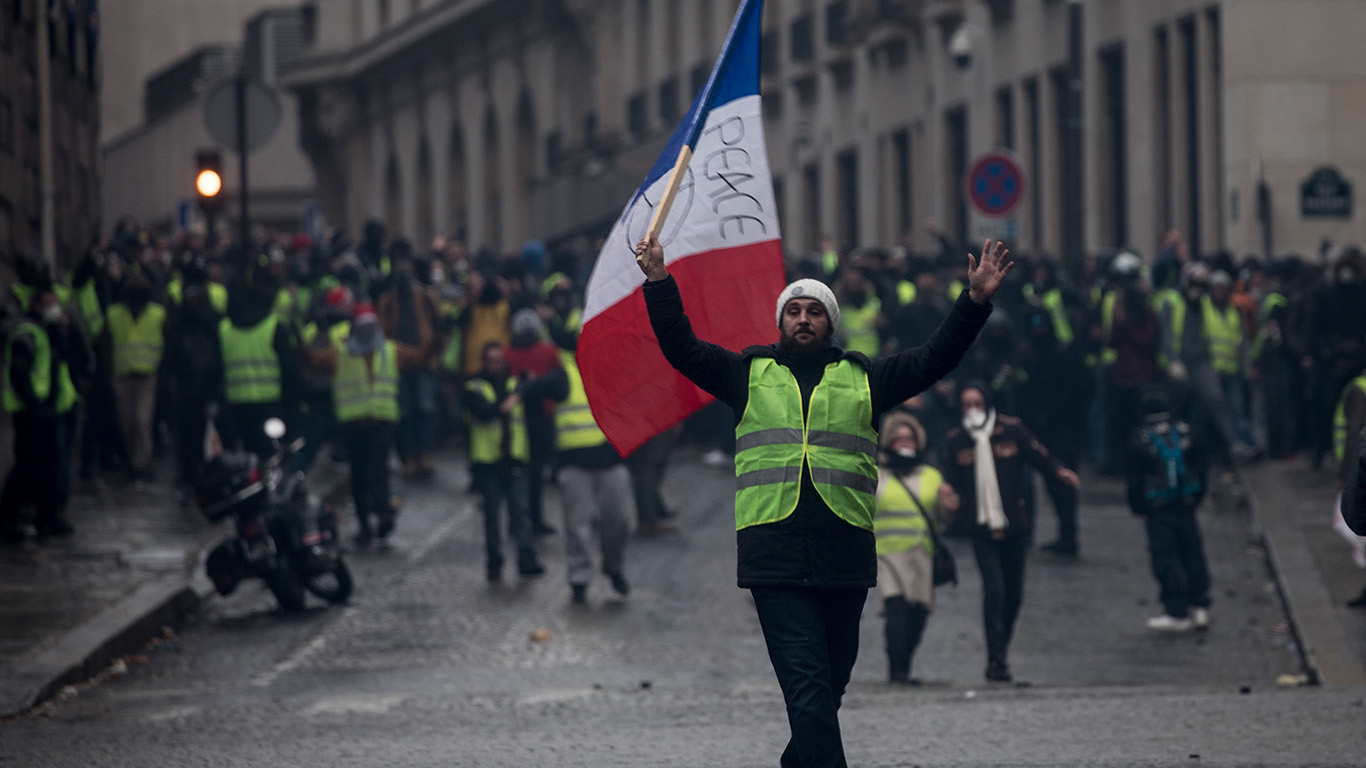
French protests
Thousands of protestors of the so-called yellow vest movement, which began in rural France and spread to urban areas took to the streets in November to protest the imposition of a fuel tax by President Emmanuel Macron. The latest boost in the fuel tax is part of a program begun by France in 2014 as a way to reduce fossil fuel use to combat climate change. The demonstrators believe the gasoline tax burden falls disproportionately on the working class. The demonstrations have become so powerful that they threatened to take down the administration of Macron, whom the protestors say is out of touch with their concerns. Macron was forced to cancel the increase. The violent reaction to the tax hike is an indication of the challenges industrialized nations face as they try to reduce their dependence on fossil fuels.
[in-text-ad]
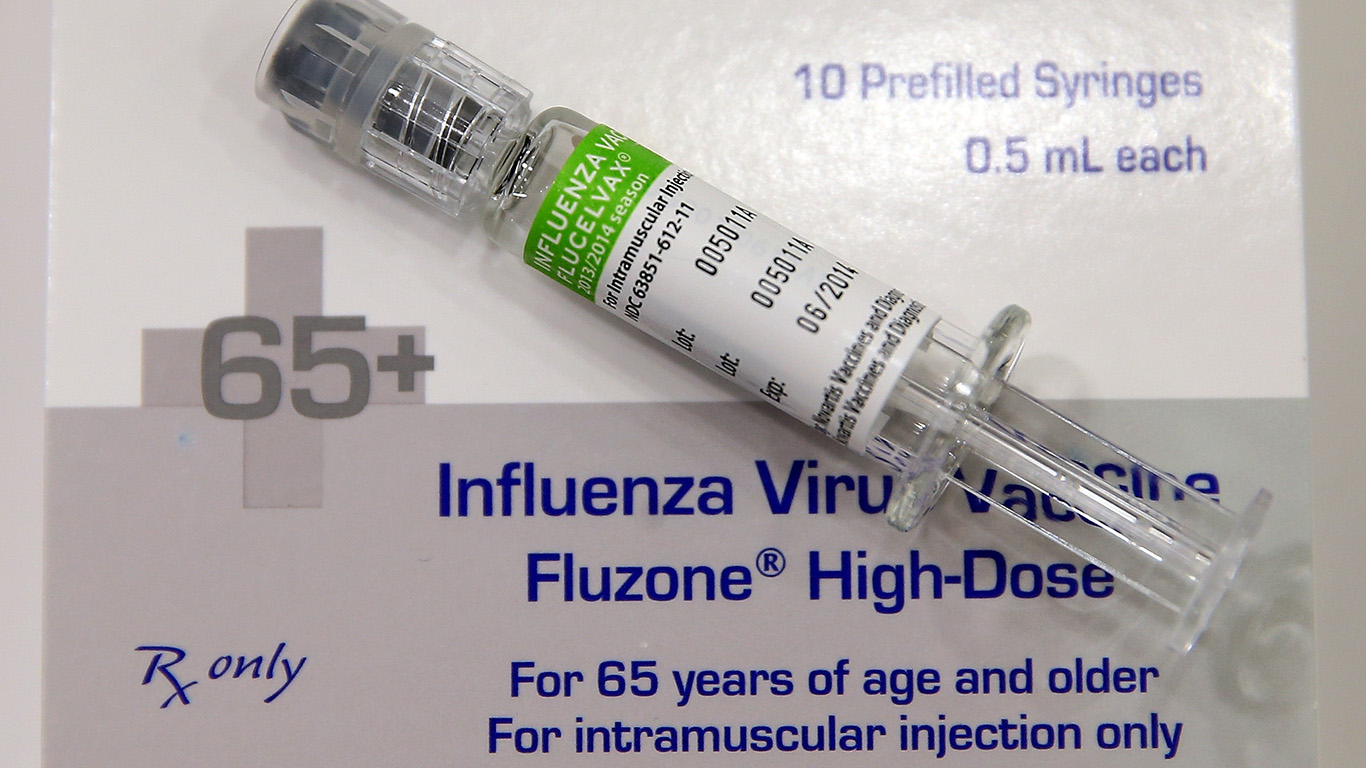
Flu outbreak
This past flu season was the deadliest in four decades. More than 80,000 Americans died from influenza and its complications, and a record 900,000 people were hospitalized, according to the Centers for Disease Control and Prevention estimates. CDC spokesperson Kristen Nordlund told CNN that the flu season severity is based on flu activity, the number of hospitalizations, and fatalities from influenza and pneumonia. The outbreak began in November 2017 and increased in intensity in January and February. The CDC also found that the flu afflicted all age groups.
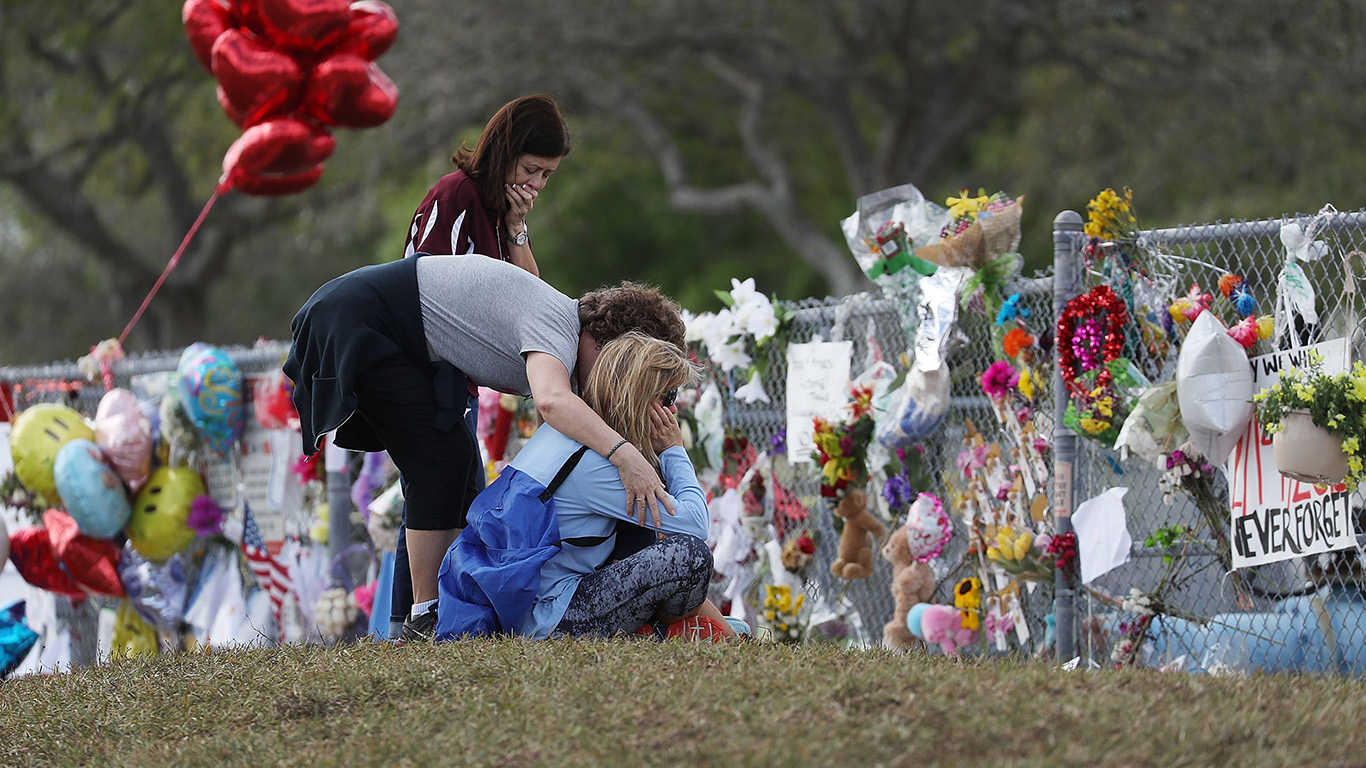
Parkland, Florida shooting
On Feb. 14, a gunman killed 17 students at Marjory Stoneman Douglas High School in Parkland, Florida. It was the worst school shooting since the horrific shooting at an elementary school in Newtown, Connecticut, in 2012. This school shooting led to increased anti-gun activism among young people, who walked out of schools in protest and participated in marches like the one in Washington, D.C. in March. More mass shootings followed. In October, a man assaulted a synagogue in Pittsburgh and shot to death 11 people in what is believed to be the deadliest anti-Semitic attack ever on American soil.
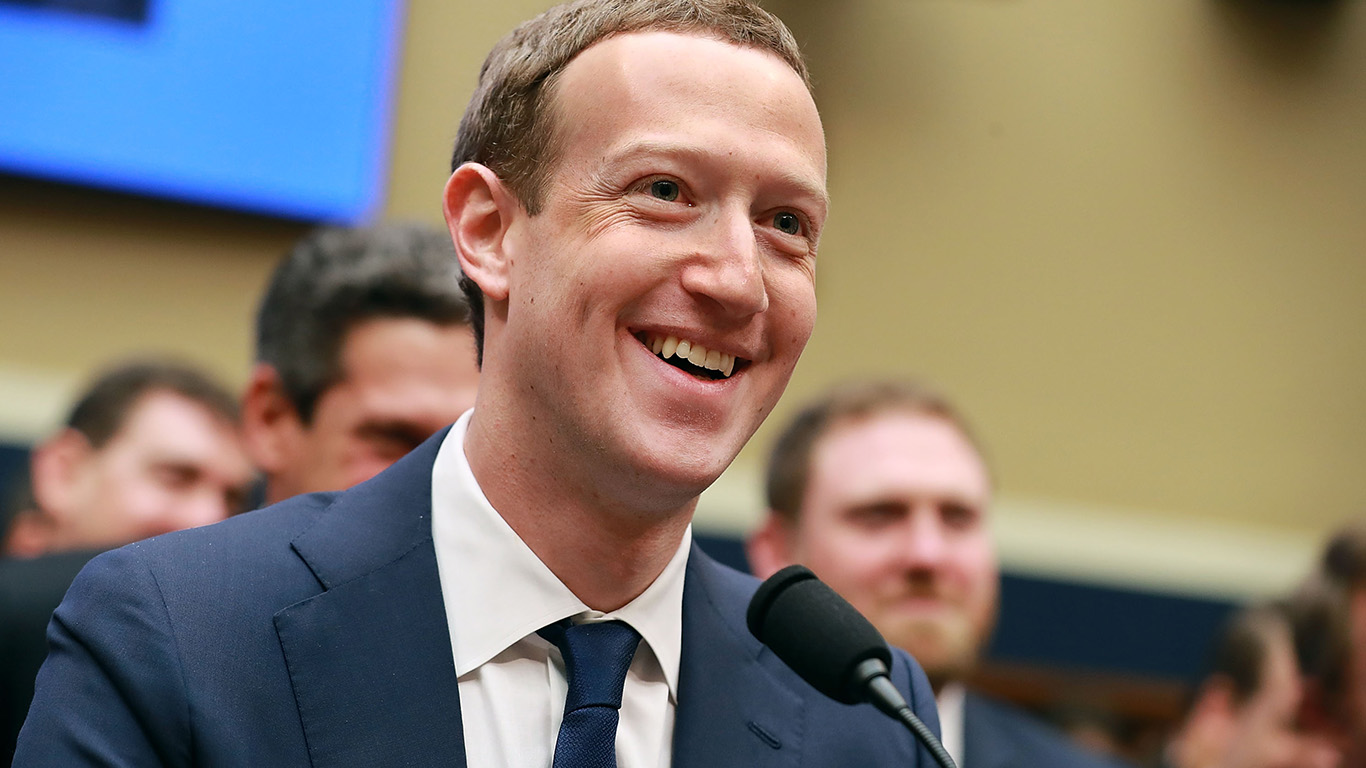
Facebook data scandal
Facebook faced a torrent of outrage in March when it was reported that the London-based political consulting firm Cambridge Analytica had accessed data from 87 million Facebook users without their knowledge. Cambridge accessed the data from account holders to help Trump’s 2016 presidential campaign. Facebook users, who had placed their trust in the company, felt betrayed and many canceled their accounts. Facebook CEO Mark Zuckerberg also faced criticism for what was perceived to be his slow reaction to the incident. Zuckerberg was questioned by Senate and House committees about the privacy issue. Facebook also lost the trust of investors, as the company shed $120 billion in market value at one point in July.
[in-text-ad-2]
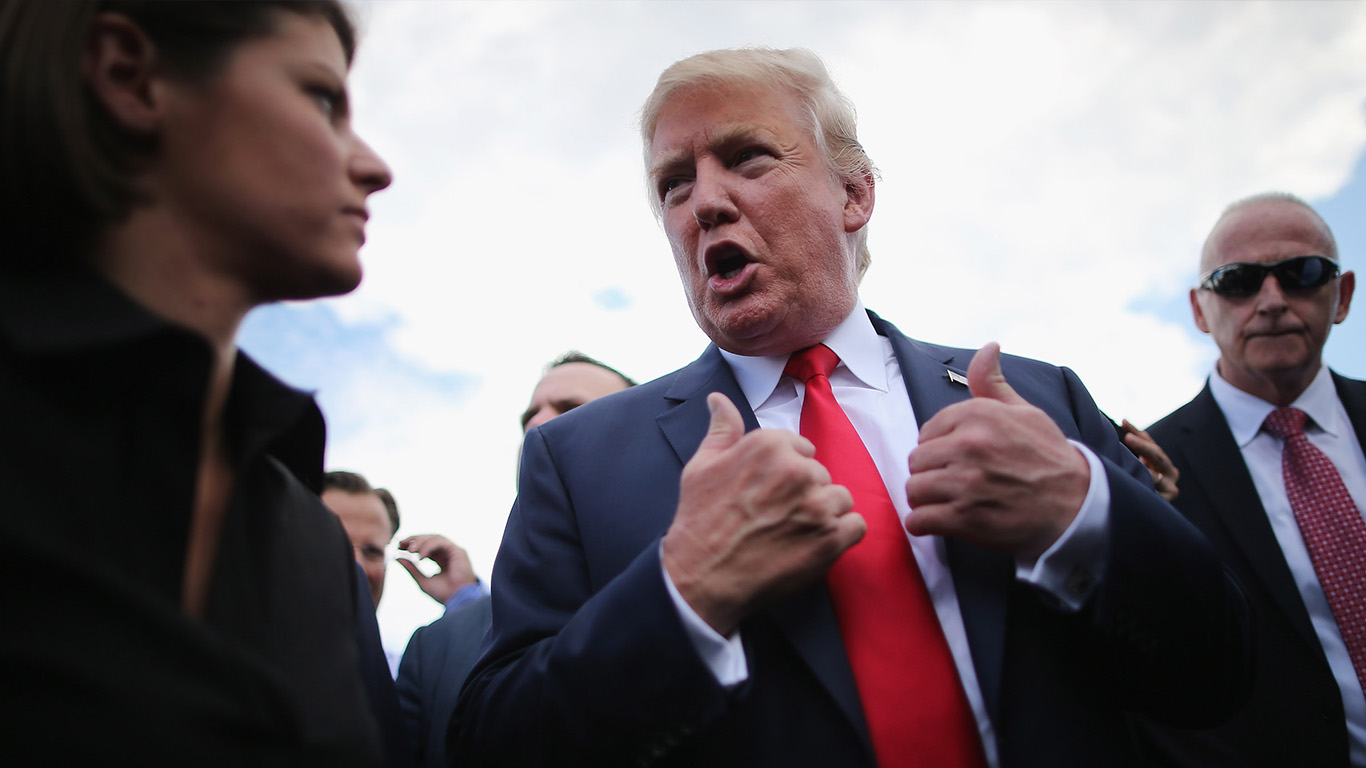
US pulls out of Iran deal
Trump withdrew the United States from its nuclear accord with Iran, a deal he criticized repeatedly when he was campaigning for president in 2016. The decision was made against the advice of America’s allies and was a rebuke to former President Barack Obama, who cited the accord as one of his foreign-policy successes. In addition to pulling the United States out of the agreement, which has been forged in 2015, Trump also re-imposed on Iran economic sanctions that would restrict its ability to sell oil to foreign customers as well as do other kinds of business. Iran is the world’s sixth-largest producer of oil. Critics of the decision said the pullout raised doubts about America’s commitment to stand by international agreements it has signed.

Trump-Kim summit in Singapore
In June, Trump and Kim Jong Un of North Korea met in Singapore, the first time leaders of the two nations had ever met. The two released a joint statement saying they intended to improve relations, work toward peace, and take steps toward denuclearizing the peninsula. There has been a ceasefire on the Korean peninsula since 1953, but the region is still considered among the most dangerous in the world. Trump said on Dec. 1 that he plans to meet with Kim in a second summit early next year. A Reuters report quoted a senior U.S. official who said negotiations on a follow-up summit to the two leaders’ first meeting have been underway since July.
[in-text-ad]

Tariff battle
Trump ratcheted up a trade war beginning in March by imposing a 25% tariff on imported steel and a 10% levy on aluminum. The tariff battle upended the stock market, which sank on the news as Wall Street was concerned how the president’s action put U.S. manufacturers and farmers in crosshairs of trade war. China said it would take steps to defend its rights. Canada and the European Union vowed to retaliate if Trump followed through on the tariff scheme. In September, Trump escalated the trade battle by slamming China with a 10% tariff on $200 billion worth of imported goods. The United States is seeking greater access to the China market, the world’s largest. A more optimistic tone on trade was struck in late November, when Trump and the heads of state of Canada and Mexico signed a renegotiated North American free trade agreement, the United States-Mexico-Canada Agreement, or USMCA, at the G20 summit in Buenos Aires, Argentina.

Syrian civil war
The world’s deadliest civil war wound down in 2018, with Syrian President Bashar al-Assad retaining power. Even so, the conflict claimed more deaths and uprooted more civilians during 2018. The Violations Documentation Center, which reports on human rights abuses in Syria, estimates that about 500,000 people have been killed or gone missing since conflict erupted in March 2011, following pro-democracy demonstrations. The United States was not able to shape events in the region, and the war’s result likely indicates a decline of U.S. influence in Syria.
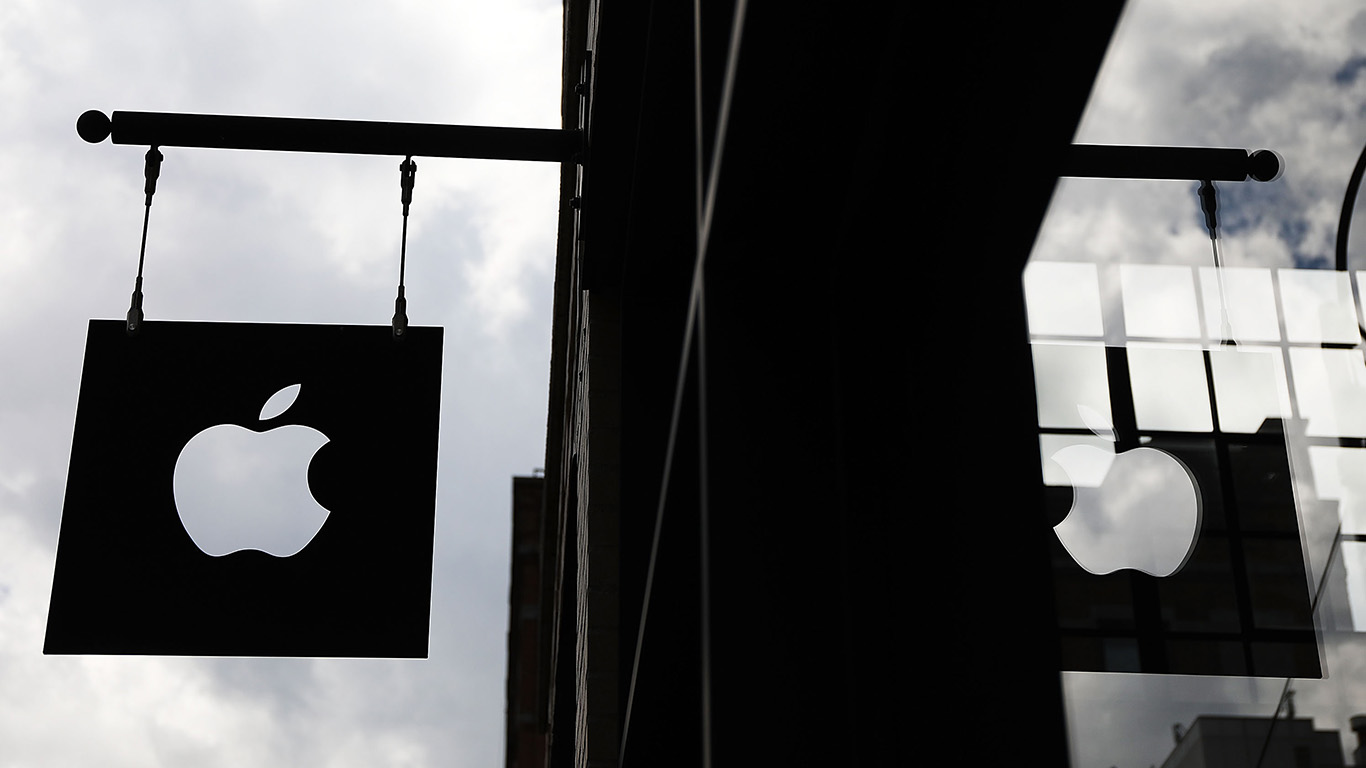
Apple first company worth $1 trillion
IPhone maker Apple Inc. on Aug. 2 became the first company to be worth $1 trillion in market valuation. Apple reached the milestone when its shares surged 2.9% following an encouraging third quarter earnings report earlier in the week. Apple reached the $1 trillion level at about noon, when its share price rose to $207.05. The company’s shares were also buoyed by large stock buybacks. Apple shares have since fallen to $165.48 as of Dec. 14. Microsoft and Amazon might be the next companies to top $1 trillion in market valuation.
[in-text-ad-2]
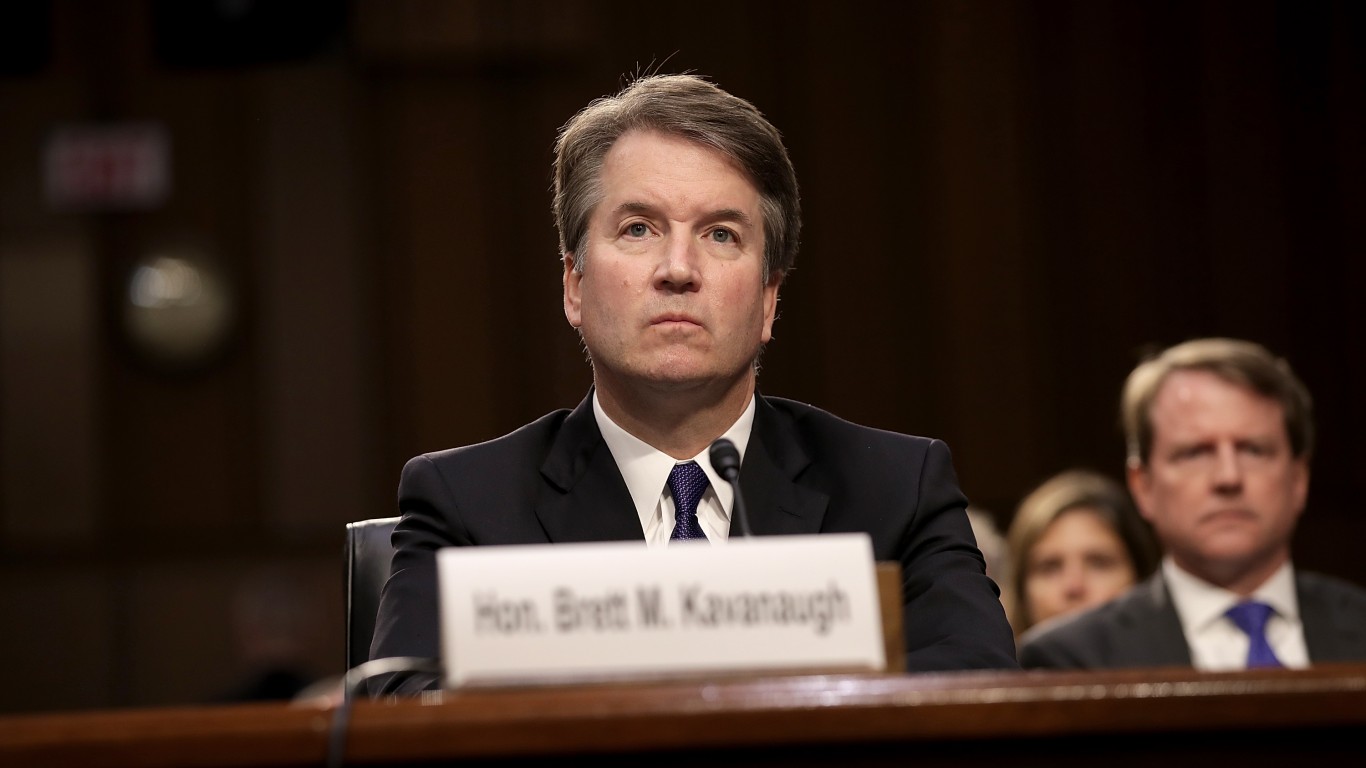
Kavanaugh confirmation hearings
Brett Kavanaugh was confirmed as a Supreme Court justice in a tumultuous nomination process that raised issues about sexual harassment, privilege, and jurisprudence. Opponents believed the nomination of Kavanaugh would tilt the ideological balance of the nation’s top court in favor of conservatives. Abortion rights advocates were concerned a more conservatively disposed court would revisit constitutional protections for legal abortion, one of the nation’s most polarizing issues. Following Kavanaugh’s nomination, several women came forward, claiming sexual misconduct by Kavanaugh decades earlier when he was in high school and college. In a contentious hearing, one accuser testified before the Senate Judiciary Committee, though no proof or witness accounts corroborating the incidents was provided.
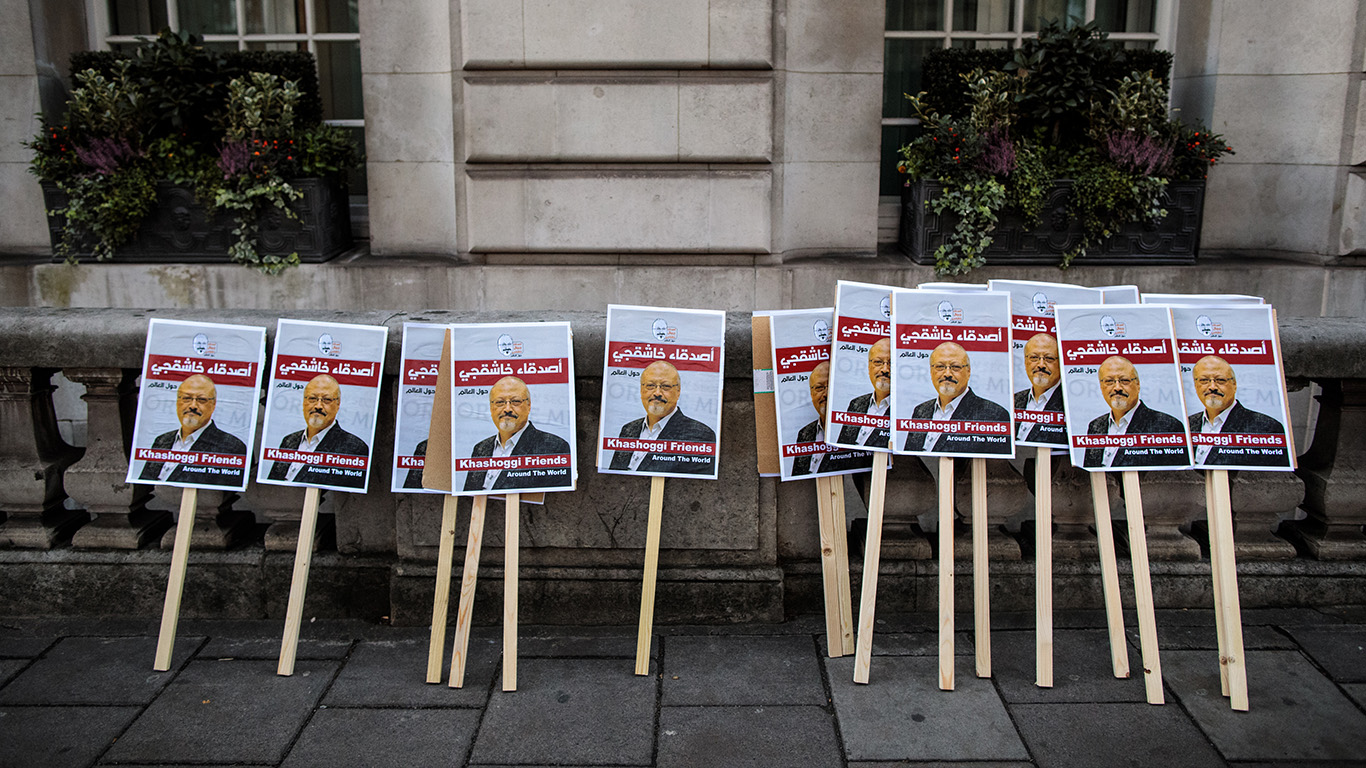
Khashoggi assassination
The assassination of Washington Post columnist Jamal Khashoggi at the Saudi embassy in Turkey in October strained the relationship between the United States and its Saudi Arabian ally. Khashoggi was a frequent critic of the Saudi regime, and a growing body of evidence suggested Saudi Crown Prince Mohammed bin Salman was involved in the assassination. Trump was reluctant to impose sanctions on Saudi Arabia, saying he needed more direct proof, though the CIA concluded that the crown prince ordered the murder of the journalist. Critics said the United States has not been doing enough to defend press freedoms and human rights.
[in-text-ad]
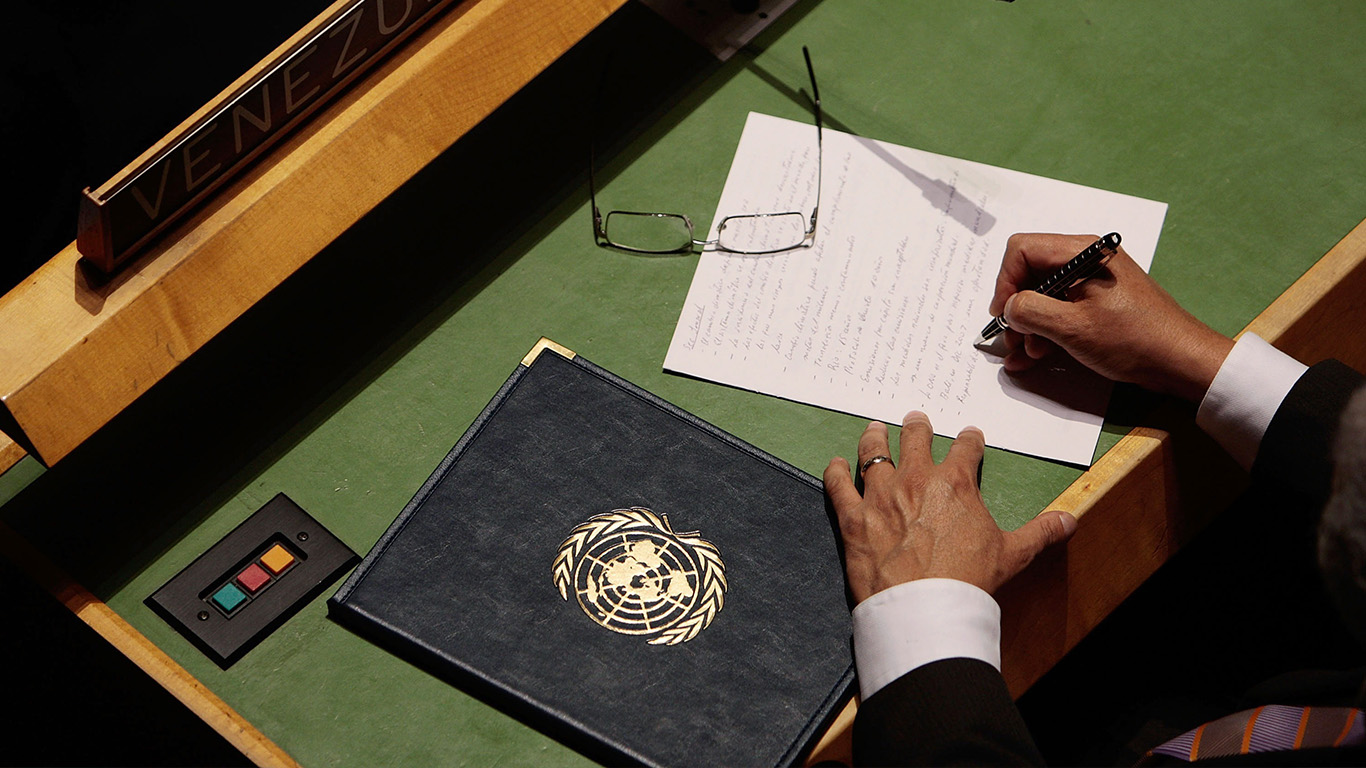
UN climate report
A report from the United Nations scientific panel in October outlined a more dismal future for the planet because the ruinous impact of climate change is occurring faster than previously believed. The report, from the Intergovernmental Panel on Climate Change, described a dire future of worsening food shortages and wildfires, and a significant decline of coral reef mass by 2040. The report asserts that to avoid the coming catastrophe, the world would have to transform its economy on an unprecedented scale. The report was the first one commissioned by world leaders under the Paris agreement, which was signed by nations in 2015 to combat global warming. In 2017, the Trump administration announced the United States it will withdraw from the accord..
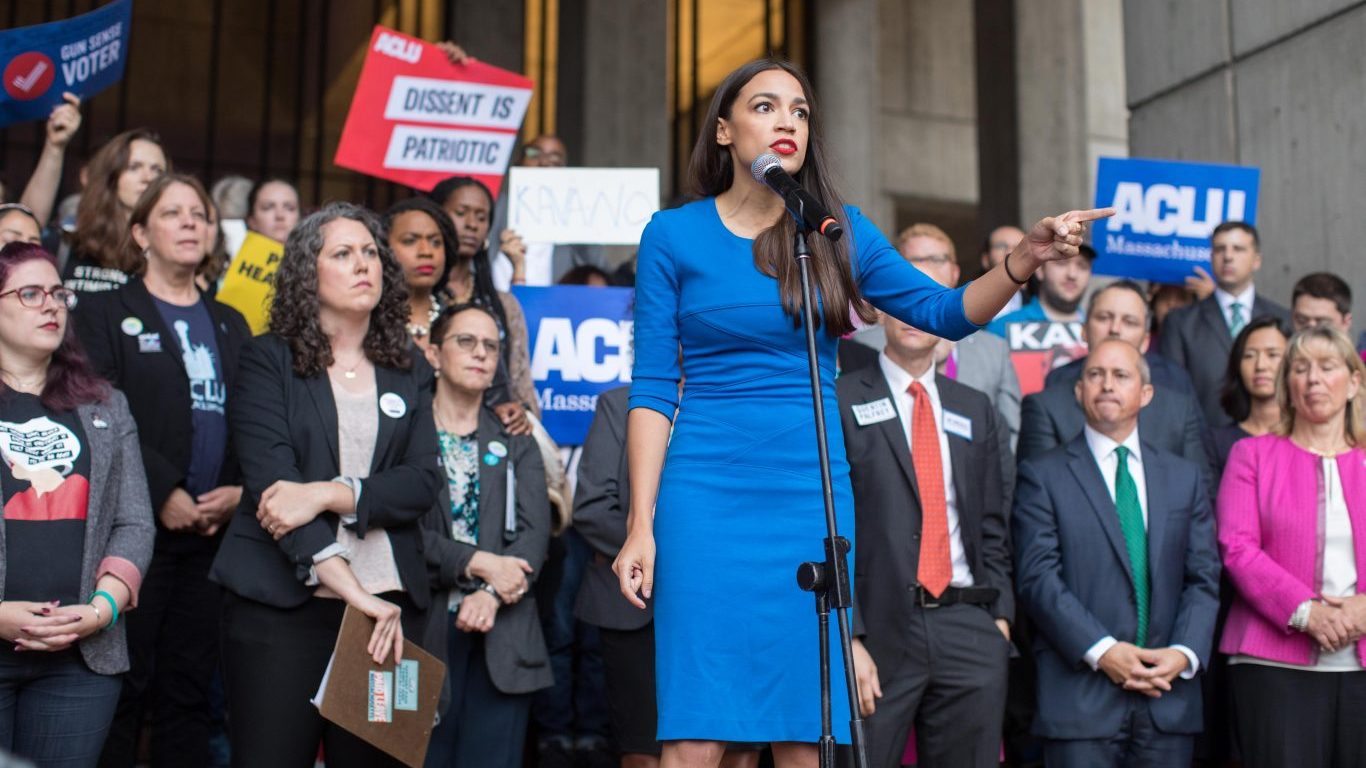
Democrats regain House
Democrats captured the majority of seats in the House of Representatives for the first time in eight years, in a rebuke of President Trump. The Democrats had won 40 seats as of Dec. 6. . For the first time in U.S. history, more than 100 women will take their place in the chamber. Among them are 29-year-old Alexandria Ocasio-Cortez of New York, the youngest congresswoman ever elected, and the first two Muslim congresswomen. Rep. Nancy Pelosi, who had been Speaker of the House from 2006 to 2010, will likely return to that position. Democrats will likely intensify probes into Trump’s business dealings and try to block his agenda.
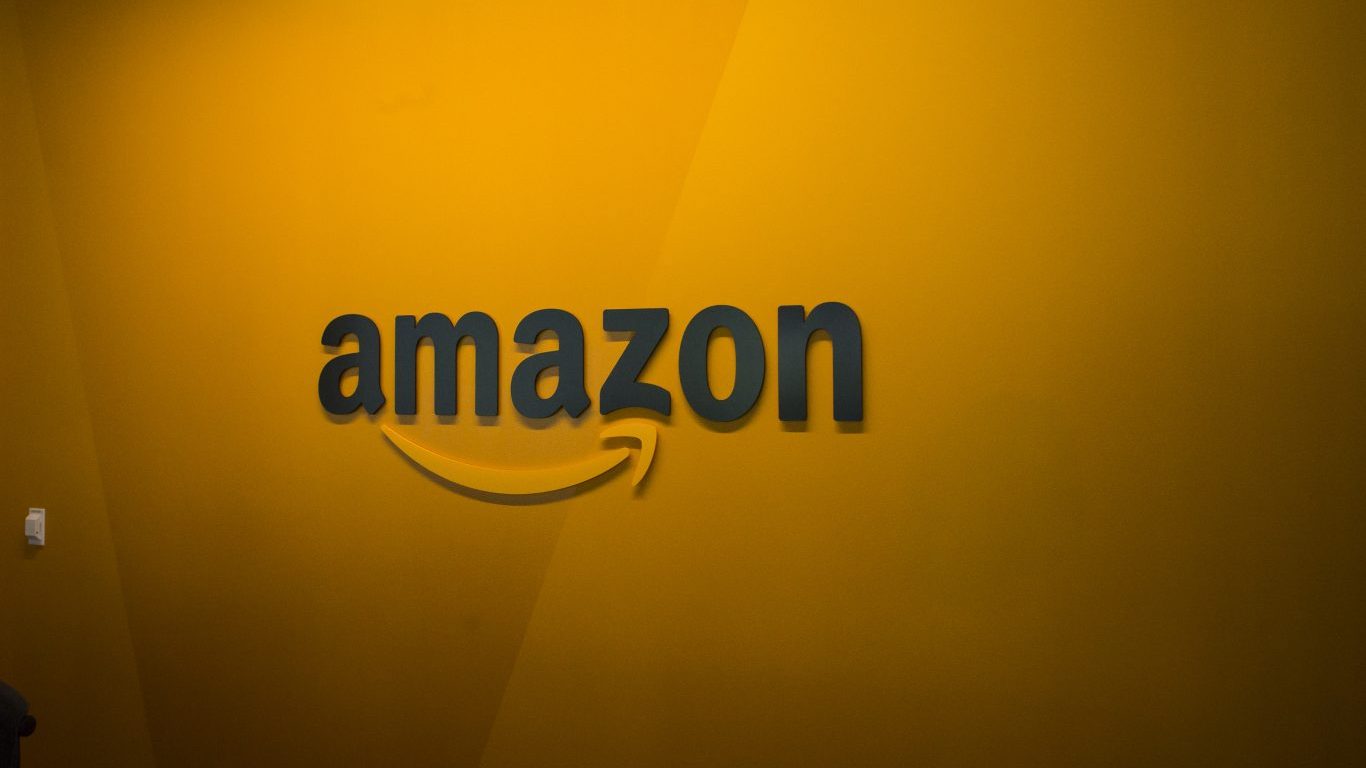
Amazon picks HQ2
Amazon ended its prolonged search for its second headquarters, or HQ2, in November by dividing the headquarters between Long Island City in the New York City borough of Queens, and Crystal City in northern Virginia. The decision ended a quest that involved 238 candidates jostling to be the home for the e-commerce dynamo’s second headquarters. Both locations provided lucrative tax incentives to Amazon, one of the world’s biggest companies, and critics on the left and right cited this as another example of crony capitalism.
[in-text-ad-2]
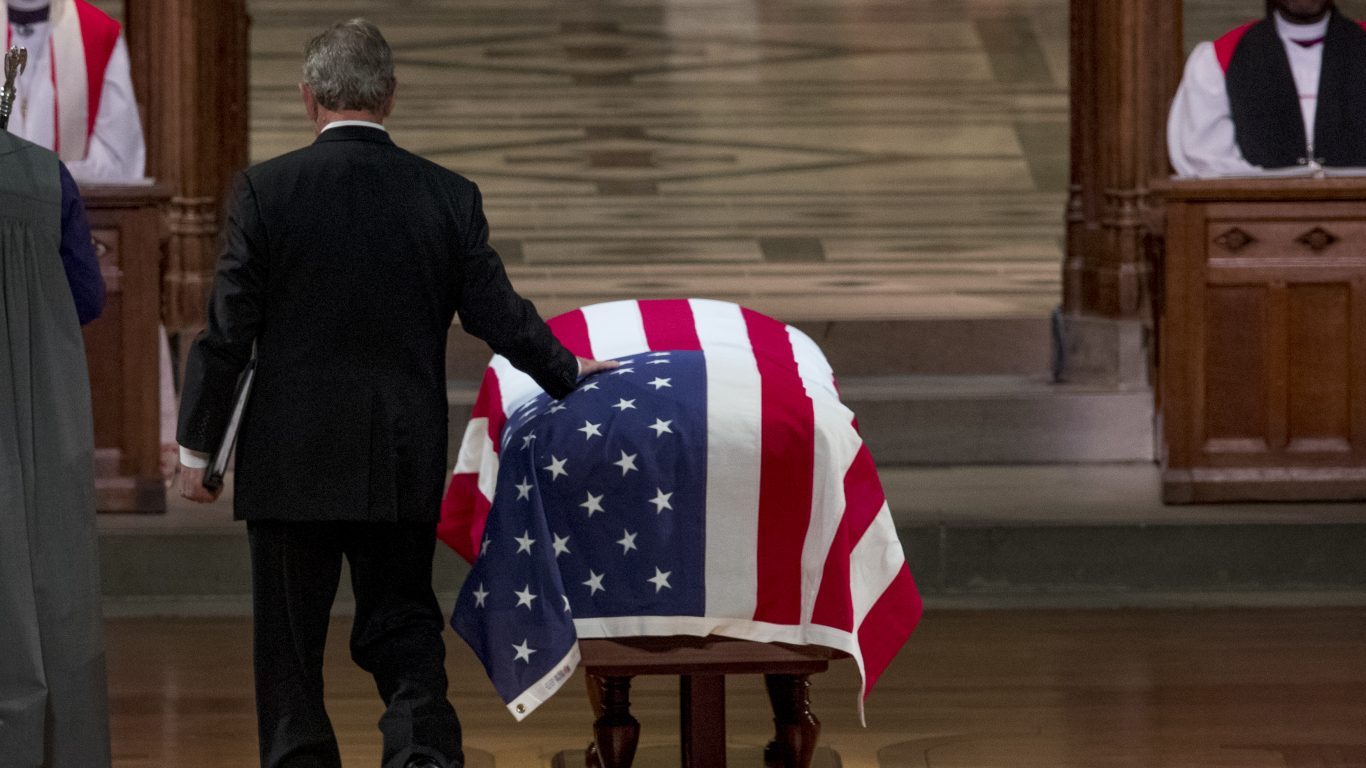
Bush death
George H.W. Bush, the 41st president of the United States, died on Nov. 30. He was lionized by Democrats, Republicans, and the media for his expert statecraft, courage, and ability to work with both political parties. Bush deftly managed the end of the Cold War without conflict, refused to gloat over the demise of the Soviet Union, helped smooth the reunification of Germany, and created an international coalition to expel Iraq after it had invaded Kuwait. He was also lauded for his life in public service, starting when he enlisted in the Navy at 18 years old and flew missions against Japan in World War II. For many political pundits, Bush’s death, as well as the passing of Sen. John McCain earlier this year, signaled the end of an era of political goodwill and bipartisanship.
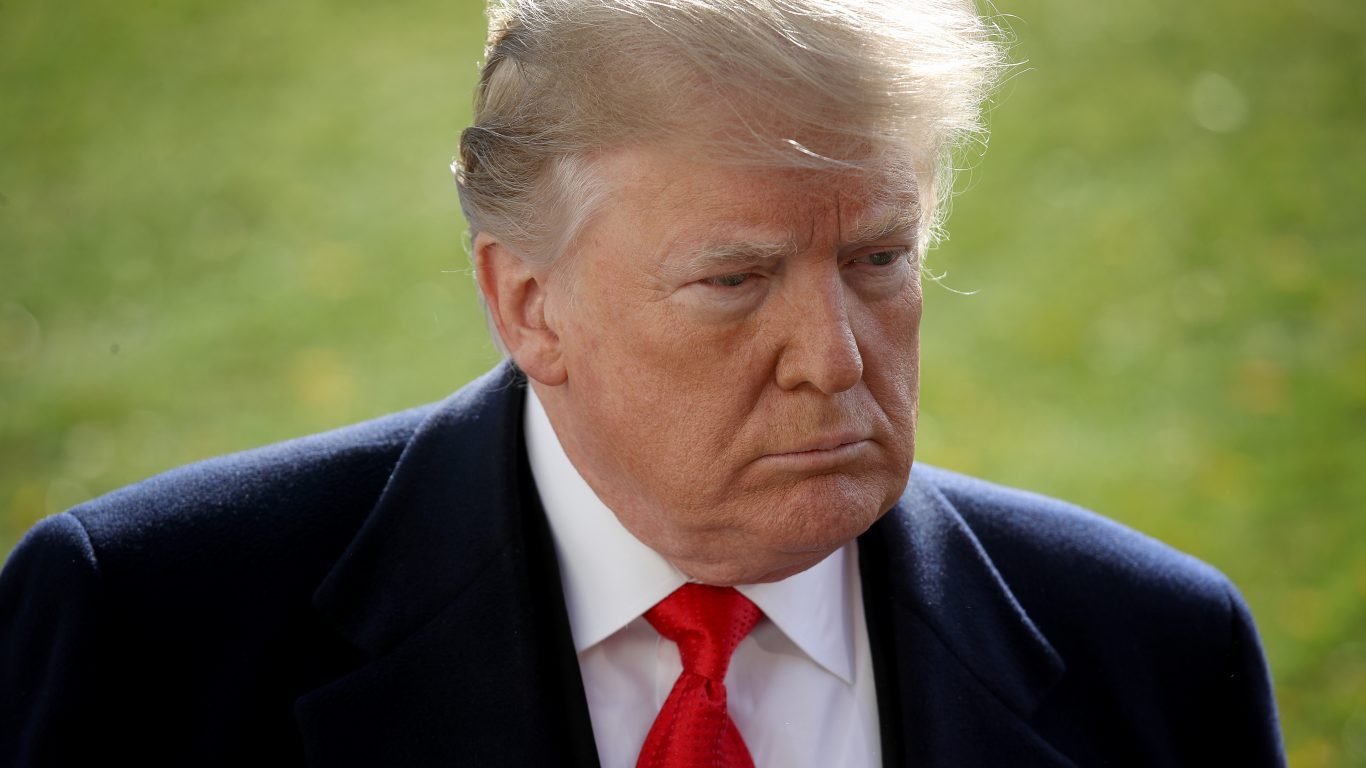
Trump investigations
The investigation of Trump by special prosecutor Robert Mueller shifted into a higher gear in early December. In documents made public on Dec. 7, federal prosecutors working with Mueller outlined a scheme in which former Trump attorney Michael Cohen paid hush money to porn star Stormy Daniels and Playboy model Karen McDougal, both of whom said they had affairs with Trump. In August, Cohen had said the payments were made at the behest of Trump and the prosecutors in early December concurred that the president directed the payments, which some legal experts say violates federal election laws. Cohen was sentenced to three years in prison by a federal judge in New York on Dec. 12, after the so-called Trump fixer pled guilty to campaign finance violations, tax evasion, and lying to Congress about Trump’s past business dealings in Russia.
[in-text-ad]
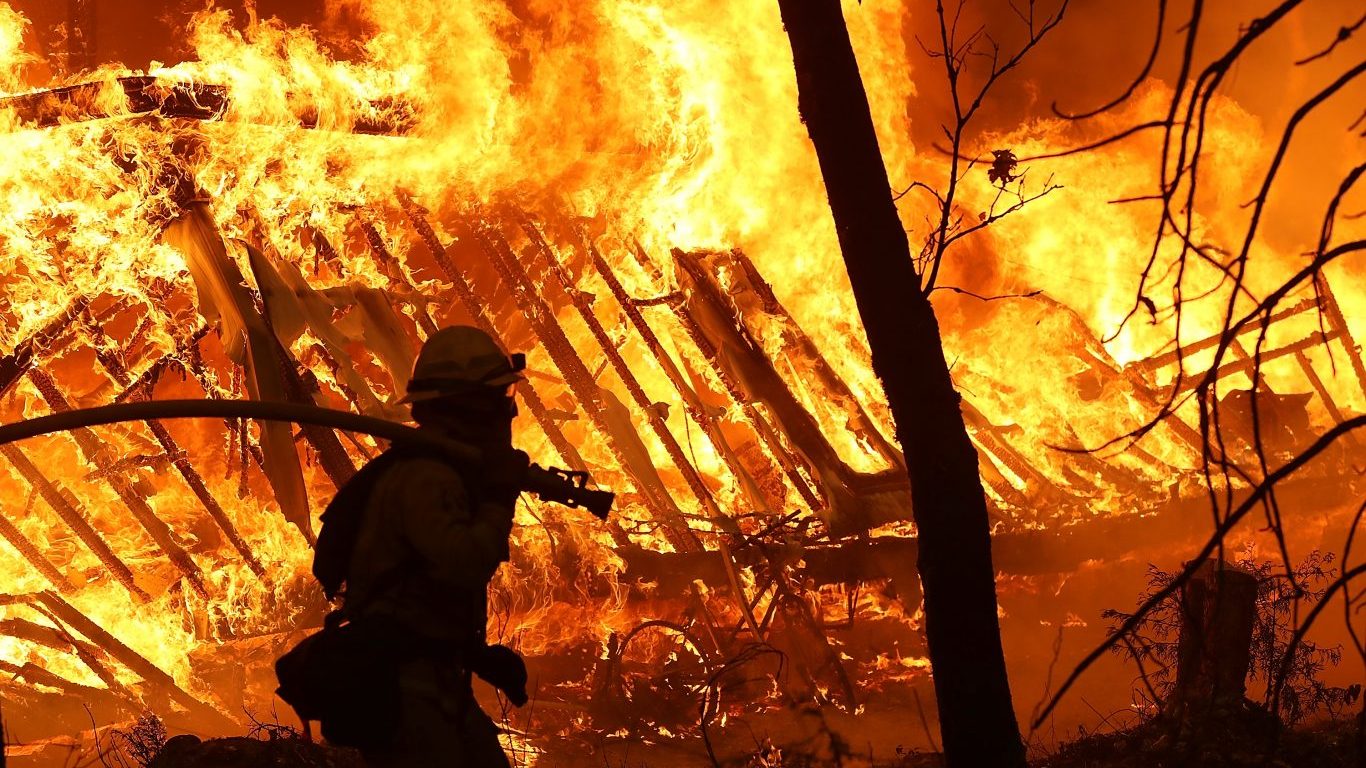
California wildfires
California’s calamitous wildfires this year have been the worst in state history. A total of 8,434 fires broke out in the state, destroying nearly 2 million acres. The Camp and Woolsey infernos began on Nov. 8 and lasted for much of November. Those fires claimed the lives of 88 people, seared more than 250,000 acres, and destroyed nearly 14,000 homes. According to an AccuWeather story in late November, the wildfires will cost the California economy $400 billion. Experts said that among the factors contributing to the extensive devastation were population growth into more areas at risk of fires, equipment malfunctions, and climate change.

Florida recount
There were no hanging chads, but in a reminder of the fiasco surrounding the Florida vote recount of the 2000 presidential elections, the Sunshine State was forced in November to recount hundreds of thousands of votes in some areas to determine the winners of close races for Florida governor and senator. Some snafus occurred during the process, which led to much hand-wringing and the fear that democracy was being undermined. Eventually, Democrat Andrew Gillum conceded the governor’s race to Ron DeSantis, and Bill Nelson lost his bid for re-election to the Senate to Republican Rick Scott.

Hurricanes Florence and Michael
The 2018 hurricane season will be remembered as one of the most destructive in our nation’s history and an indication that a warming planet and warmer oceans are fueling more destructive storms, according to the The National Oceanic and Atmospheric Administration. There were 15 named storms this season, eight of which were hurricanes, and two — Florence and Michael — were classified as major storms. Florence struck the continental United States in September and caused major flooding in North and South Carolina. Michael, a Category 4 storm, was the strongest hurricane on record to strike the Florida panhandle. Over the last two hurricane seasons, the United States has been hit by four Category 4 hurricanes of at least 130 mph – Harvey, Irma, Maria, and Michael – the most in 150 years of weather records.
[in-text-ad-2]
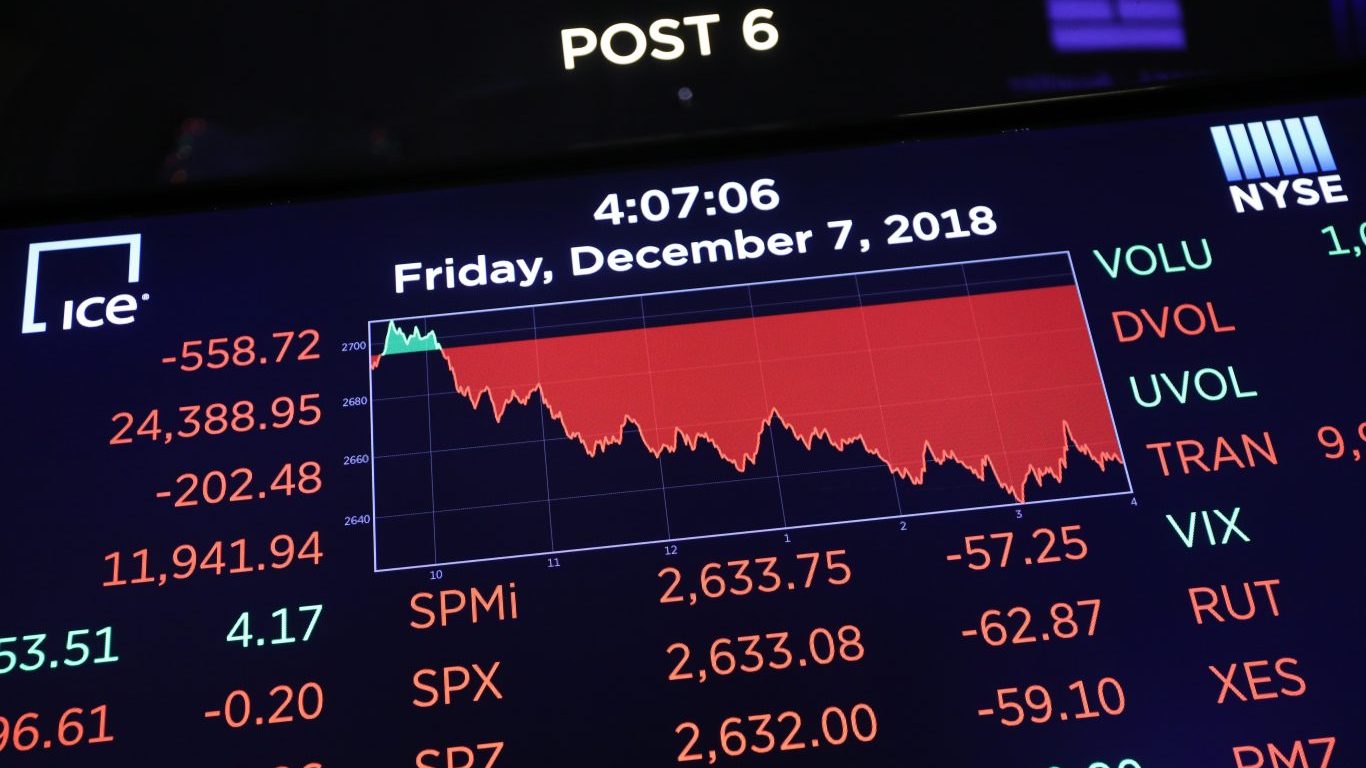
Stock market gyrations
Volatility has returned with a vengeance to the stock market, as evidenced by the 799-point drop on the Dow Jones Industrial Average index on Dec. 4 over renewed trade-war concerns, two days after the Dow had risen 288 points on news the trade tensions with China were easing. Investors this year have dealt with two corrections — pullbacks of at least 10% from market peaks. Experts have pointed to many factors to explain current market weakness, including protectionism fears, the Federal Reserve raising rates too quickly, disappointing corporate profits, and forecasts that economic growth will slow in 2019. Friday brought more bad news as weak economic data from China and Europe help send the Dow down almost 500 points. The benchmark Standard & Poor’s 500 Index is down 11% in the fourth quarter, and on pace for its worst performance in seven years.
Methodology
To determine the most important news stories of 2018, 24/7 Wall St. reviewed media sources and Google Trends to gauge the events that had the biggest impact this year.
The Average American Is Losing Momentum on Their Savings Every Day (Sponsor)
If you’re like many Americans and keep your money ‘safe’ in a checking or savings account, think again. The average yield on a savings account is a paltry .4%* today. Checking accounts are even worse.
But there is good news. To win qualified customers, some accounts are paying nearly 10x the national average! That’s an incredible way to keep your money safe and earn more at the same time. Our top pick for high yield savings accounts includes other benefits as well. You can earn up to 3.80% with a Checking & Savings Account today Sign up and get up to $300 with direct deposit. No account fees. FDIC Insured.
Click here to see how much more you could be earning on your savings today. It takes just a few minutes to open an account to make your money work for you.
Thank you for reading! Have some feedback for us?
Contact the 24/7 Wall St. editorial team.
 24/7 Wall St.
24/7 Wall St. 24/7 Wall St.
24/7 Wall St.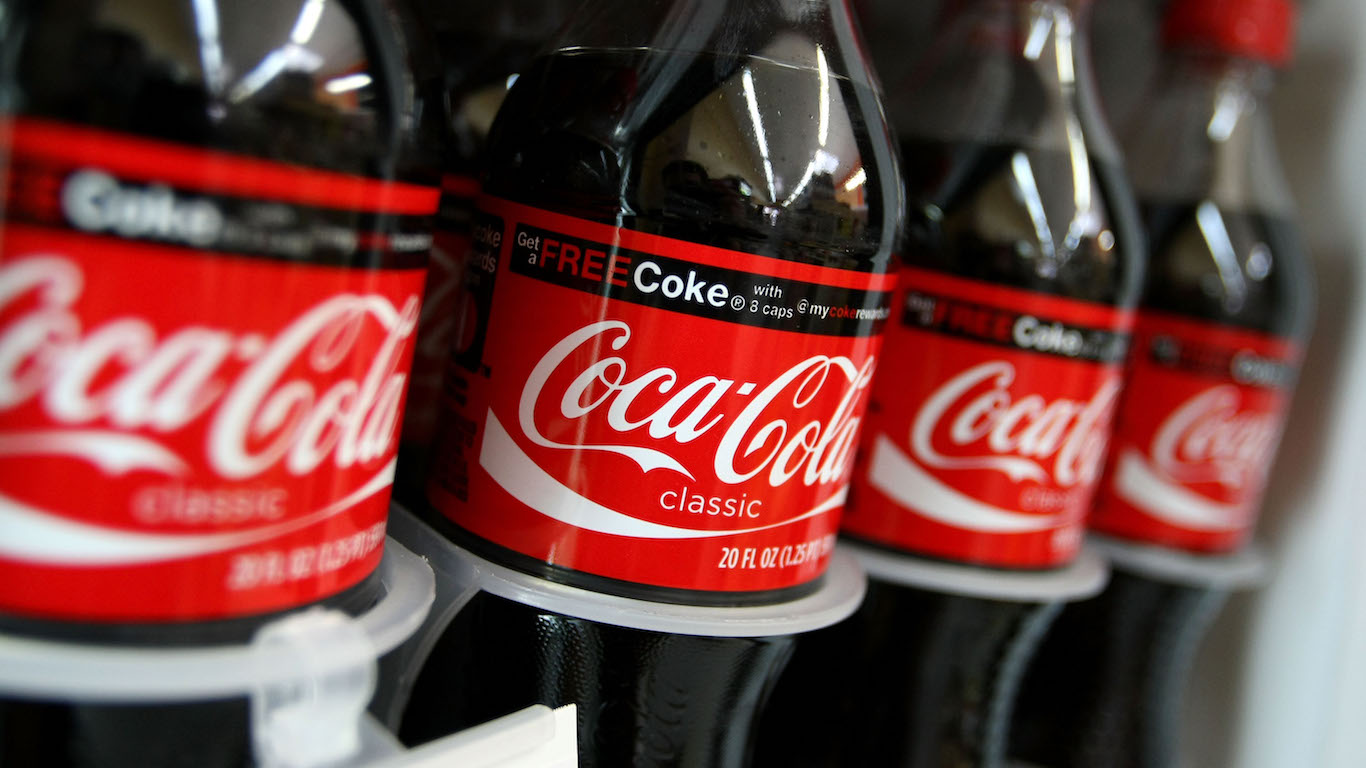 24/7 Wall St.
24/7 Wall St.


